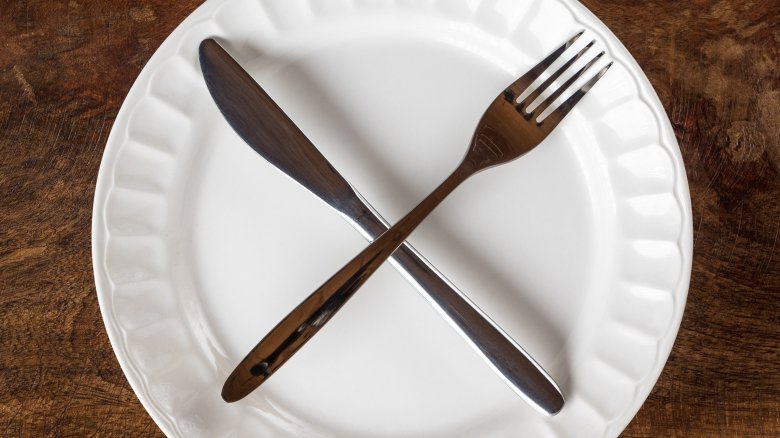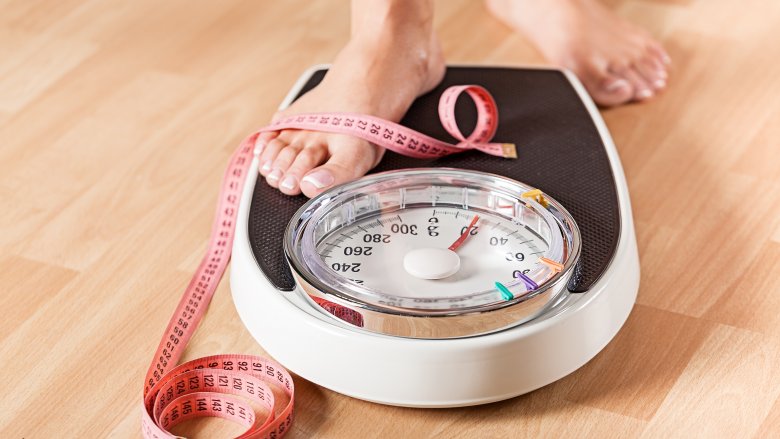Former Vegetarians Tell Us Why They Gave It Up
We may receive a commission on purchases made from links.
Have you ever thought about giving up meat for good — or have you ever actually given it up? For some, it seems unthinkable, but for others it's an easy choice. There are a number of reasons why people make the tough decision to become vegetarians. From animal cruelty concerns, to health reasons, to trendy #vegetarian posts on Instagram, becoming a vegetarian may be the right choice for many of the people in your life — maybe even for you. But that highly disciplined diet isn't easy, and it's definitely not a lifestyle that works for everyone. So what makes a committed vegetarian go from kale smoothies to bacon cheeseburgers? Oftentimes, there's more to the story than just an intense craving for a medium-rare steak. I had the chance to interview former vegetarians and learn exactly what made them make the switch. These are the reasons former vegetarians went back to being carnivores.
My body craved meat
A common theme from the former vegetarians I spoke with was listening to their bodies. So many started noticing symptoms and cravings that let them know it was time to make a change. "My body simply started craving meat again, and I was starting to have a lot of digestive issues eating the way I was," registered dietitian nutritionist Emily Cooper told me. "I listened to my body, slowly started eating meat again, and found myself a lot more satisfied at each meal."
My blood type needs meat
When health concerns come up, vegetarians need to make the tough call of whether or not to stick with it. Many felt tired and never satisfied when they weren't eating meat.
"I found that my blood type O+ functions better with a small amount of red meat within my diet," yoga teacher Brittney Hiller told me. "After becoming more aware of the farm-raised beef in my area, I switched to eating only locally-grown meat. My sleep was affected most while vegetarian, and now I sleep soundly. I still have an 80/20 diet of 80 percent plant-based and 20 percent meat-based."
I wanted to become pregnant
Living with fertility issues weighs on an entire family, so if introducing meat into your diet could help, many vegetarians would understandably make a change. When acupuncturist Elizabeth Trattner struggled to become pregnant for years, giving up her vegetarian lifestyle made all the difference.
"My body needed it [meat.] In fact, I didn't get pregnant for ten years after I was married," Dr. Trattner told me. "I started eating turkey and became pregnant after six months. My body had to eat animals up the food chain."
I became sick
When I think of a vegetarian, I imagine someone who is the picture of health. However, when being a vegetarian causes you to feel sick all of the time, it's not worth any other health benefits. "I have always been very compassionate to animals, and the thought of eating another animal's flesh made me sick, however, not consuming animal protein made me sicker," Dr. Trattner explained. "After my two rounds as a vegetarian and vegan, I crawled back wiped out and began slowly eating animal protein."
I ate meat by mistake
Sometimes vegetarians go back to eating meat for big reasons like getting sick or hoping to become pregnant. Other times you simply eat meat by mistake and never look back.
"I was a vegetarian for quite a bit, until one day I was at a dinner with friends," Founder of The Chef & The Dish Jenn Nicken told me. "We were eating rice that tasted just phenomenal! I remember eating it quite quickly... until I realized there was a reason it tasted so good. My friends, who knew I was a vegetarian, kept looking at me. It was then I realized and asked, 'Is there pork in here?' I continued eating, and that was the end of being a vegetarian." To be fair, it would be very difficult to eat pork fried rice and then go back to the vegetarian kind.
I realized I didn't have a healthy relationship with food
Being a vegetarian is a serious commitment, but when that commitment starts to turn into the start of an obsession, it is time to seriously examine why you're doing it.
"Part of the reason I became a vegetarian, though I might not have admitted it at the time, was for diet reasons and to be healthier. Avoiding meats, particularly red meats, seemed like an easy way to avoid certain foods and to lose weight," Abby Hofrichter told me. "Even though I didn't have a very healthy relationship with food at 17 years old, I started to realize that was not a good reason to abstain from meat and wasn't going to be livable for me anymore." Hofrichter made the difficult decision to walk away from a lifestyle that had become too restrictive for her and her health needs.
I found kinder ways to eat meat
One of the most common reasons to become a vegetarian is out of concerns for animal cruelty. However, not all meat is raised the same, so it's possible to make kinder choices while still eating meat. "I dislike our meat and dairy industries and had major issues with that starting at a young age," explained Hofrichter. "It started with the unnecessary animal cruelty that would happen, but as my vegetarianism continued I learned more about the economic and environmental effects of mass meat production, and that's still something I dislike today."
When Hofrichter decided to start eating meat, she made sure to only choose meats that are responsibly and ethically raised. "However, I started to realize that simply not taking part in this huge industry wasn't making much of a difference. Rather, as I got older and made money and gained more purchasing power in the world, perhaps choosing to support small and local farmers would be a better thing to do," shared Hofrichter. "Perhaps spending my money at restaurants who source responsibly, rather than chain restaurants would have more of an impact than going to those chain stores and eating the (not very good) vegetarian options."
My iron level was too low
Living as a vegetarian or vegan means you may miss out on certain nutrients more common in meat. You can certainly find these nutrients in plant foods and supplements, but it may be more difficult.
"I recently went from being vegetarian to eating some meat due to low iron in pregnancy," health food blogger Larissa Dundon told me. "My doctor said I could take a supplement, but that the best way to get the iron was to ingest it. Prior to this assessment, I was having dizzy spells unlike anything I've ever experienced before. That and I found that I was spending so much more money on meals, because I (or my husband) would make something vegetarian for dinner, but then he would still be hungry and unsatisfied so we'd make a second meal."
I was losing muscle
Eating lean meats like chicken breast is a healthy way to increase your protein intake. If you're unable to get enough protein from plant sources, eating meat may be the right next step for you.
"I was losing muscle due to insufficient protein," Susan Schenck, LAc, author of The Live Food Factor and Beyond Broccoli, told me.
And it wasn't just Schenck's muscles that were suffering from the lack of protein. "My brain was also losing capacity due to lack of brain food like fish and egg yolks."
I was gaining weight
I've always assumed that all vegetarians are naturally thin, because they're always eating vegetables. However, that's not always the case. Let's not forget that bread and pasta are meat-free. "I was gaining weight due to excess carbs," explained Schenck. "I found that meat is actually slimming." Schenck told me that first, meat keeps hunger at bay, keeping you from needing to raid the pantry an hour after lunch. It also boosts our metabolisms.
"It doesn't stimulate insulin release, as carbs do. Insulin causes fat storage," shared Schenck. "Eating small amounts of meat (two to six ounces per day) helps me also acquire nutrients not found in plant foods, and as we get older, it is harder to convert the precursors into nutrients found only in meat."
I was always tired
When your body is not receiving enough calories and nutrients, it will naturally feel tired and sluggish. That's what happens to many vegetarians before deciding to eat meat again.
"I was vegetarian for 20 years. I got really bad hunger attacks, sometimes needing to eat four times just in the morning. I also got really tired," parenting instructor Kate Orson told me. "It's hard for me to eat most kinds of meat as I was never really into it, so I have just added in organic bacon for breakfast and organic burgers. Now I can go the whole morning without needing to eat after breakfast."
I wanted to cure my chronic illness
When Lyn Alden, founder of Lyn Alden Investment Strategy, noticed her health take a turn for the worse, she decided to do something about it. "Despite being extremely physically fit, I never felt great. I had mild headaches and digestive issues frequently," Alden told me. "I was prone to blood sugar spikes and crashes; if I didn't eat every three hours or so, I'd have an energy crash. Especially when I exercised, I had to time my snack, like an apple or a granola bar, perfectly ahead of time. My fasting blood sugar was 96 mg/dl, just four points away from being classified as pre-diabetic in my early 20s, and I had depression." Alden realized her diet needed an overhaul, so she decided to start incorporating meat.
I wanted to cut carbs
In addition to the chronic illnesses, Alden was also frustrated with feeling sluggish after eating too many carbs as a vegetarian. "I also decided to cut my carbs and become better at burning fat rather than carbs for energy. I feel much better on a low-carb, whole-foods diet. It's high in fat and very low in glycemic load," Alden told me. "My fasting blood sugar decreased by more than 10 mg/dl, my headaches and digestive issues went away, I lost three inches from my waist, and I have more energy and a far better mood."
Alden noticed everything with her health change after incorporating a small amount of meat. "Now I can easily do 24-hour intermittent fasts whenever I want, can eat or skip meals without any energy drop, have better body composition and insulin sensitivity, visible abs, and better all-around health," shared Alden. "It's freeing to have control over my meals, rather than the other way around."
I couldn't keep up in sports
It is possible for serious athletes to fuel themselves as vegetarians, but much more challenging. "I was a vegetarian for many years, and it ended up being very unhealthy for me. Since I'm physically active (hiking, skiing,exercising), and my vegetarian diet was low calories, I was constantly hungry and ate a lot of carbs and processed foods such as pastas, breads, gluten grains, and candy bars," author of Anatomy for Success Ronald Kaufman told me. "I would too often eat a 1,500 calorie bag of cookies in one sitting. It was also hard for me to get the quality protein I needed to rebuild muscle. Socially it was a hassle, as I would go to a party and eat so much of the veggies and carbs that often there wasn't enough left for others. And the prep time and monotony of my food options became tedious."
Kaufman decided to try eating meat again to see if he could have more endurance for sports. "After craving meat for many years, I finally gave in and started eating it again," shared Kaufman. "I eat organic meats, grass-fed beef, wild fish, beef protein powders, mostly organic fruits and vegetables, sprouted grains, free range eggs, dairy limited to grass fed butter, use low heat cooking, and a lot of healthy spices. I need meat to feel my best, and even though spiritually I would prefer to be a vegetarian, meat is what works for me."
I kept getting colds
Sometimes vegetarians give it up even when they love the diet and lifestyle. "I actually loved it. I never got food coma, felt a bit more energetic and overall better. But after some months I noticed I was getting sick more with colds and the flu," founder of Vyteo.com, Stephen Gibson told me. "I don't get sick that often, so I felt like something was wrong. I went back to eating meat and returned to not getting sick. I'd still love to go back to being a vegetarian and trying to make extra sure I get all the nutrients I need. I recommend it to anyone, even if it didn't work out for me."















